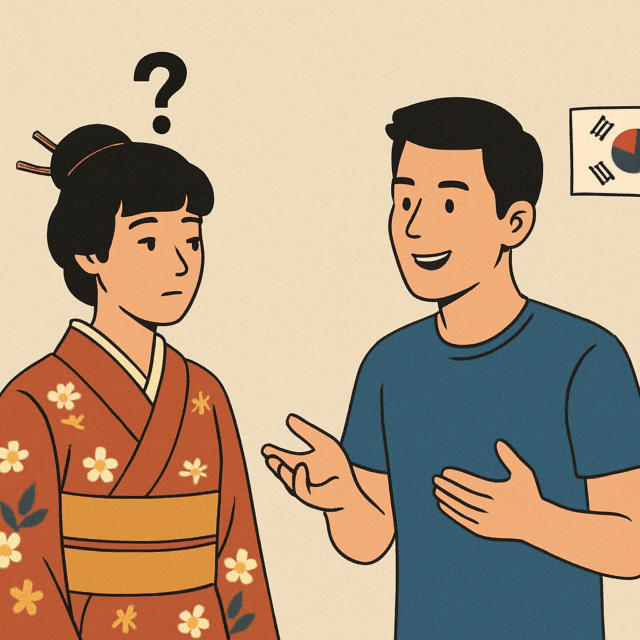Recently, while mindlessly watching videos following YouTube’s algorithm, I came across this video.
“Japanese people’s shocking reaction to hearing Korean men’s perceptions of ‘Sushi Women'”
It was a video showing Japanese people’s reactions after introducing them to the image of “Sushi Women” commonly found on the internet. The format involved reading to Japanese women the characteristics that are circulated on Korean communities and SNS with statements like “This is why Sushi Women are good,” and listening to their responses. The Japanese women’s reactions were consistently along the lines of “Isn’t that obvious?”
While I thought ‘the title seems exaggerated,’ when I saw comments like “truth bomb” and “when did these things stop being normal in Korea,” I started having many thoughts.
 Source: ChatGPT
Source: ChatGPT
‘Basic etiquette’ that appears in the Sushi Woman fantasy
The characteristics of ‘Sushi Women’ appearing in the video are as follows:
- Combining money when getting married and starting according to financial circumstances.
- Going Dutch on date expenses, or at least planning to pay the next time.
- Frequently saying thank you and being good at apologizing.
- Being thankful when the husband does housework and helps with childcare.
- Maintaining proper manners and greeting the man’s parents well.
- When arguments arise, trying to talk calmly without shouting or emotionally exploding.
Additionally, traits like “consistently using polite speech,” “having less emotional fluctuation,” and “considering others’ positions first” are often mentioned. The essence is an image of ‘a polite, quiet, and self-reliant woman.’
Being quiet or cool may be characteristics of Japanese people, but aside from that, most of these are just basic principles that anyone should follow as a human being. But in Korea, being capable of these things or affirming them is praised. When I previously saw an article about a YouTube vlog video of a wife making lunch for her husband receiving terrible comments, I thought it was just bored, attention-seeking trolls, but upon reflection, it seems that’s not the case.
A society where ‘basics’ have become ‘fantasy’
Saying thank you when receiving help, apologizing when making a mistake, greeting others with a bright smile, and doing your own tasks without being told… Seeing the internet treat these obvious behaviors like a “fantasy” about Sushi Women, if this isn’t just internet communities’ typical exaggeration, it made me wonder if basic interpersonal etiquette has gone extinct in Korean society today.
Why must these basic courtesies in male-female relationships be praised with comments like ‘that’s legendary,’ ‘as expected of a Sushi Woman’? Does this conversely mean that in Korea, those who maintain etiquette are seen as ‘suckers,’ and being the first to say thank you or sorry means ‘losing’?
Terms like ‘push and pull’ in dating have been around for 20 years. People would discuss who gives less and gets more, talking about being led or controlled, but that was merely the level of envious comments while observing others’ love affairs or relationships. However, looking at recent internet community reactions, both ‘love’ and ‘dating’ seem to be calculated in terms of profit rates and win rates. While I tend to think of ‘marriage’ as an economic phenomenon, making economic considerations in marriage reasonable, when all these emotions start being converted into numbers, is there any ‘respect’ left?
In such a society, these universal courtesies would naturally become non-everyday ‘fantasies.’ In a social atmosphere where expressing small gratitude or regret between lovers is perceived as ‘submissive behavior,’ those obvious manners will appear like fictional ideals. And those who consume this fantasy will increasingly see the gap between reality and morality, becoming more pessimistic about reality.
 Source: ChatGPT
Source: ChatGPT
A nation of courtesy without courtesy
Just a hundred years ago, we prided ourselves on being the ‘Land of Eastern Courtesy.’ It was a regular term appearing in public broadcasting or what would now be called “patriotic shows,” but thinking back, it seems like it’s been a long time since I’ve heard such words. There was a time when respecting elders, valuing manners, and living harmoniously with neighbors were emphasized even on broadcasts, but nowadays, have all these become “evils,” “old-fashioned notions,” and “Confucian Taliban”?
But if the result is the ridicule and hostility prevalent in Korean internet culture today, perhaps the “Confucian Taliban” was right after all. Among the comments mentioned above, there were responses like “anyway, such women change once they get ‘kimchi stained'” or “kimchi-stained Sushi Women are the worst hybrid.” This suggests that this ridicule and hostility are directed towards their own country.
But if I point this out, people will probably start “punching down” by saying things like “foreigners have even worse manners” or “Sushi Women are obscene and promiscuous.” Nevertheless, the essence of this problem remains the collapse of etiquette culture and human relationships within Korean society.
Looking at this, maybe the fertility rate of 0.78 is actually miraculous.
Maybe it’s not ‘Sushi Women’ but ‘Foreign Women’
Of course, Japan is also a place where people live, and there are strange individuals everywhere. Socially, there are various issues like patriarchy, gender role enforcement, glass ceiling problems, etc. But at least in terms of ‘etiquette,’ it’s still a society that maintains basic standards. They try not to inconvenience strangers on the street, always say “excuse me” and “thank you,” and if a child misbehaves, it’s fundamental for parents to discipline and manage them. Considering how they attach ‘culture’ to ‘meiwaku’ (inconvenience), it might seem natural in Japan, but is this really unique to Japan?
Since the video topic is about Japan, we’re discussing Japan, but looking at how foreigners living in Japan behave, the “Sushi Woman trait” doesn’t seem to be a characteristic of Japanese women but rather universal human manners.
The fact that Koreans feel ‘Sushi Women are different’ might just be evidence that Korea has collapsed too much.
I remember that the term ‘Sushi Woman’ originally began to be used in a derogatory sense, but somehow it has become an object of praise on Korean internet. Initially, it was used to mock or ridicule Japanese women’s sexual image or submissive attitude, but over time, it began to be consumed as a symbol of ‘etiquette and consideration’ lacking in Korean society. This might reflect dissatisfaction with Korean women, and further, a rebellious psychology against Korean social trends.
But the essence is that what we once considered so obvious as ‘basic’ has now become something rarely seen in daily life, and therefore, we’ve projected it onto the (easy target) external image of ‘Japan’ and come to yearn for it.
The order in which a society breaks down is as follows: 1st stage: etiquette is ridiculed, 2nd stage: trust disappears, 3rd stage: the relationships constituting society begin to collapse.
Present-day Korea seems to be somewhere around the 3rd stage.
It’s a sad situation.
